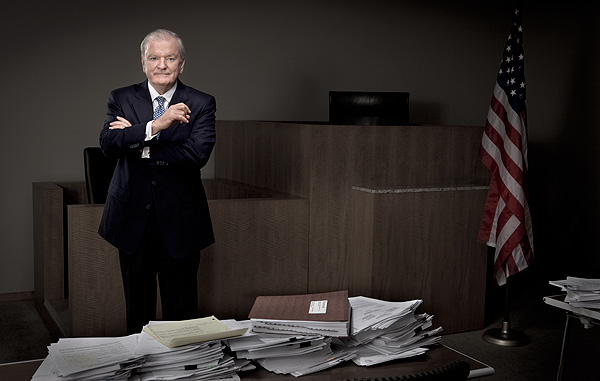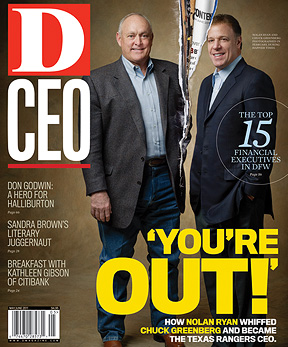Dallas trial lawyer Donald E. Godwin was taking a rare Friday off from work to attend his first Kentucky Derby when he got the phone call from Halliburton.
It was May 1, 2010, about two weeks after the British Petroleum/Deepwater Horizon “Macondo” oil rig explosion that killed 11 men. Thousands of gallons of oil still were gushing into the Gulf of Mexico, and Halliburton had been responsible for cement work on the well.
Godwin, it turns out, is Halliburton’s go-to-man when things get sticky. Back in 2002, as the company’s lead counsel, he’d settled more than $4 billion in asbestos cases in a single year.
Stephanie Bragg, a former partner at Godwin’s Dallas law firm who now is Halliburton’s chief litigation counsel, was calling to say the giant energy products and services company needed him to take the lead once again. “There’s going to be lots of investigations,” Godwin recalls Bragg saying.
Godwin hopped a plane to Halliburton’s headquarters in Houston, and he’s been the lead trial lawyer and focal point for one of the world’s biggest litigation battles ever since.
British Petroleum, or BP, has set up a claims fund totaling $20 billion in anticipation of claims that are expected to exceed $50 billion. Numerous government entities are investigating the 5 million-barrel spill, including a special commission appointed by President Barack Obama. Also in the mix are hundreds of lawsuits filed on behalf of those affected by the Gulf Coast devastation.
Although much of the focus is on the actions of BP, rig owner Transocean, and Cameron International, which supplied the rig’s blowout preventer, Halliburton has been named in about 400 class-action lawsuits. Godwin and his team are facing a veritable who’s who of plantiffs’ attorneys in New Orleans, where all the cases have been centralized in a multi-district litigation court.
Godwin recounts with enthusiasm his countless flights to Louisiana, the numerous depositions and court hearings there, and his daily encounters with dozens—often hundreds—of plantiffs’ attorneys.
“I may be more excited now that I have been in a long, long time,” says Godwin, 63, in his smooth southern drawl. “I’ve never known a day in the practice of law that has not excited me. But I’m more energized now with the new Halliburton matter maybe more than I’ve ever been.”
Long Hours
After 37 years practicing law, Don Godwin still loves grueling schedules and jury trials. His colleagues use terms like force of nature, tenacious, single-minded, and relentless to describe his work ethic. When he’s not in court, he practices those skills in a mock courtroom at the offices of his law firm, Godwin Ronquillo, at Renaissance Tower in downtown Dallas.
The task ahead in the Halliburton litigation doesn’t seem to deter the fit, 5-feet-11-inch lawyer, who starts most days with a 5 a.m. run.
“This came along at a good time for Don,” says Bert Cornelison, executive vice president and general counsel at Halliburton, of the oil-spill litigation. “It has brought him a renewed energy and focus, and I absolutely think it’s the perfect case for him. It’s a large complex piece of litigation with high-level interests at stake in which all of the parties at the lawyer level will contest it pretty bitterly.
“There are few people that you would more want at your side if you have to have a fight in a dark alley then Don,” Cornelison says.
As the term “lead trial lawyer” suggests, Godwin is in charge of all litigation, depositions, and hearings on the class-action suits. That means he does all the talking. He’s working with a team of about 25 lawyers in his firm’s Dallas and Houston offices plus six paralegals and a dozen support staff, and with Bragg’s staff in Houston.
Although Godwin was able to wrap up 380,000 asbestos cases in one year, he expects it will take several years for the oil-spill litigation to play out.
“I think it would be unrealistic to expect we would get anything done where Halliburton would not be a part of it inside the next couple of years,” he says. “There will be some very large trials. Matter of fact, there are going to be a couple in New Orleans in early fall and some large trials in February 2012, where a judge has set aside four months of trial time for one case” to determine liability, allocation, and responsibility.
All the cases are centralized in the New Orleans multi-district litigation court before Judge Carl Barbier, while pleadings, hearings, depositions, and conferences are before special Magistrate Judge Sally Shushan. Halliburton’s Louisiana base is at the well-appointed Loews New Orleans Hotel, a block and a half from the federal courthouse. Despite TV-inspired images of cordial lunches and after-session happy hours, Godwin says that isn’t the case.
“I go to court and depositions” and back to the hotel, he says. “I don’t see them, they don’t see me.”
He’s referring to the more than 700 lawyers participating in the Louisiana hearings. Fifty of them are defense lawyers for Transocean, BP, Cameron, and Halliburton. All the rest are plaintiffs’ lawyers. “They are some of the finest plaintiffs’ lawyers in the United States, and all are opposed to us,” he says.
So far, Halliburton is conspicuously absent from a Justice Department lawsuit, filed last December, which named nine defendants including BP and Transocean. More defendants could be added at a later date, Justice Department officials say.
As a BP subcontractor, Halliburton has been accused by some of using an “unstable” cement mixture that may have contributed to the blowout of the Macondo well. A White House panel found that BP knew of the instability and failed to conduct additional tests. This isn’t the first time BP has had issues with Halliburton’s cementing capabilities. A 2007 BP audit showed Halliburton didn’t have the experience to evaluate data and performed incomplete testing reports, a presidential panel said in February 2011.
Halliburton says it did not conduct additional stability tests on the Gulf oil well, but points to BP’s well design as the culprit.
If Halliburton is deemed an “owner” or “operator” of the Macondo rig down the road, the legal battlefield could change, says Brendan Cummings, senior counsel for the Arizona-based Center for Biological Diversity, which has filed its own lawsuits relating to the spill.
However, “given the way most federal liability laws related to oil spills are structured, the biggest legal battle Halliburton is likely to face is not from the federal government or private parties claiming damages from the spill, but from BP, seeking to offset some or all of the money they will have to pay,” Cummings says. “So while DOJ v. BP is the most important case in Round One of the oil-spill litigation, Round Two will likely be BP v. Halliburton, and the outcome of that case could be devastating to Halliburton’s future.”
Exactly who’s to blame for what’s been called the worst offshore oil disaster in the nation’s history is still a matter of fierce public debate, of course. BP is first on the list, but the rig subcontractors are taking their share of the heat as well. Godwin acknowledges that fishermen, charter boat companies, hotel and land owners, and others who make their living on the Gulf—from Texas to Florida—are seeking their due for a lifestyle compromised by the spill.
But he says Halliburton is battling a reputation it doesn’t deserve.
“I think Halliburton got a bad rap publicly about a lot of things that Halliburton didn’t do, so much as was done by KBR,” he says, referring to the former Halliburton subsidiary once known as Kellogg Brown & Root. “There were some things done by employees at KBR that damaged the solid reputation and image Halliburton had for so many years. It’s taken a lot of time for people to accept Halliburton for the very fine company it is.”
Halliburton sold its ownership in Houston-based KBR, which was one of the largest military contractors in Iraq, in 2007. In addition to billing problems that surfaced with the subsidiary’s work there, KBR’s Iraq contracts had been criticized for being politically influenced because then-Vice President Dick Cheney had previously served as Halliburton’s chairman and CEO.
“A lot of people were against Halliburton because of Vice President Cheney, and they wanted to pin everything on Halliburton,” Godwin says. “It was a way of being angry over some events that had come about that led to the reputation being tarnished, if you will. But Halliburton is working hard with a lot of people all over the world to restore that image. I think it’s on the road to recovery and doing a fine job in that regard.”






